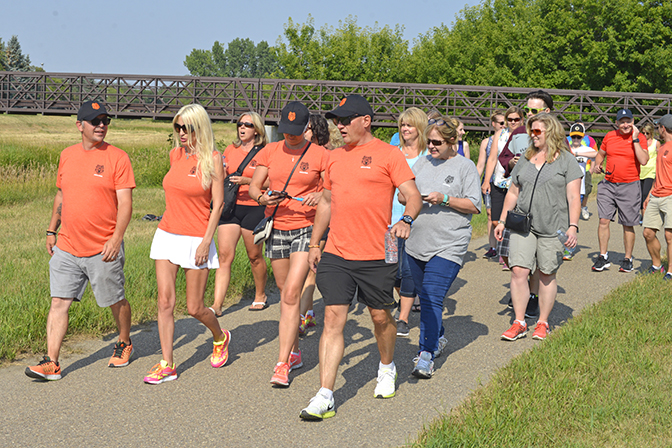As “victor” is the opposite of “victim”, Theo Fleury brought a message of healing and hope during his Victor Walk in Swift Current on July 19.
Fleury led a three kilometre walk from Market Square to the Ashley Park Hall along the Chinook Pathway to kick off his emotional stop in Swift Current. After a series of post-walk speeches, the event closed with an evening viewing of the Victor Walk documentary which chronicles Fleury’s 10 day Victor Walk from Toronto to Ottawa in 2013.
“Not only was it emotionally demanding, but it was incredibly physically demanding,” Fleury said of that 2013 experience. “But it was the people that stopped along the way that gave us the energy to keep pushing forward.”
Fleury is passionate about his continued advocacy for sexual abuse survivors, and the Victor Walk documentary shows the impact, and healing, those survivors of traumatic life events have experienced.
Fleury was a hockey phenom, tearing up the Western Hockey League with the Moose Jaw Warriors in the mid 80s. His best year with the Warriors came in 1987-88 when he had 68 goals and 160 points along with 235 penalty minutes in 65 games.
Fleury even joked with the crowd that “The Weasel” was back in Swift Current, referencing his years with the Warriors where he played an antagonistic brand of hockey.
“I used to raise a little bit of hell when I played. It’s nice to come back as a calm person, and have the majority of all that stuff that I went through behind me now. It’s my opportunity to give back to society, so many people have given me so much in my life. Despite all the stuff that happened with Graham (James), everything I have is still from the game of hockey. And so it’s sort of my duty now to visit these places to say thanks. And if anybody needs help we’re here and we’re more than willing to help.”
Over a 15 year National Hockey League career Fleury amassed 455 goals and 1,088 points to go along with 1,840 penalty minutes while skating with Calgary, Colorado, New York Ranger and Chicago Blackhawks. The nine time NHL All-Star won a Stanley Cup with the Calgary Flames in 1989 and he won a gold medal as part of Team Canada at the 2002 Olympics in Salt Lake.
But off the ice he was struggling to deal with the scars caused by the sexual abuse at the hands of former coach Graham James. And while on one hand his professional career was blossoming, his personal demons pushed him to increasingly erratic behaviour away from the rink.
“I think you go through stages. When it first happens to you you’re sort of in shock and you don’t know really what to do. And then you sort of cope, the aftermath of whats happened. You end up gravitating towards the dark side of life to cope. And then you come to a place where you have to make a choice – are you going to live or am I going to die. Thank God I didn’t pull the trigger and end my life because I could have never thought this is where it would all be.”
Fleury documented those struggles in his 2009 best selling autobiography Playing With Fire, plus the 2014 follow up Conversations With A Rattlesnake: Raw and Honest Reflections on Healing and Trauma which he wrote with Kim Barthel.
The Victor Walk is a further step forward for Fleury, as he has come to a realization that he can continue to help people in dealing with the trauma and healing of fellow survivors. He recalls a series of life-changing moments where people share their story with him now that he has opened the door to that conversation.
“It’s amazing. Everyday, without fail, somebody’s there that needs help.”
In addition to raising awareness, the Victor Walk Movement also raises funds for the Breaking Free Foundation (BFF), founded by Theo Fleury and other advocates. The mission of BFF is to provide survivors of traumatic life events with the treatment and support needed to reclaim their lives.

Fleury said that despite the heightened awareness of sexual abuse prevention over the past number of years, survivors continue to have to relive their trauma as a result of misdirected media coverage.
“We have to teach the media how to speak to us. When you put the victim on the screen, and they’re disheveled and vulnerable and all that, it sells newspapers and all that stuff. But that’s not the message that we want to get out there. We want the message to be that, hey, there’s help and it’s out there and you’re not going to be re-victimized again. Sometimes the media prolongs the pain and suffering. It’s easy to pick on a victim. We don’t go after the perpetrators. We don’t go after the judges that make the most stupidest decisions ever. We don’t hold those guys accountable. But we certainly hold victims accountable all the time. I don’t understand that, how that got flipped the other way.”
Fleury notes that there are surprisingly few supports in place despite the many people dealign with childhood trauma, as an estimated one in two girls and one in three boys fall victim to unwanted sexual advances before the age of 18. He points out that the mental health system is completely overrun, with line-ups of people waiting to get help. Current treatment centres have long waiting lists.
Unfortunately, trauma is the now biggest epidemic facing society.
“This is how movements start, with conversation, awareness and then the action piece comes. I believe Canada is very capable and has enough people and resources that we could tackle this problem and get people on a path of healing.”
For more information on Victor Walk 2017: http://victorwalk.com/about/about-the-walk/





